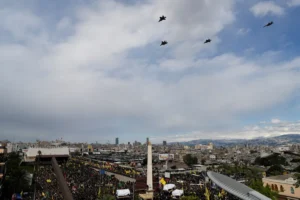Iran’s elite Revolutionary Guards Corps orders communication device ban amid security concerns

Members of Iran's Revolutionary Guards Corps (IRGC) march during the annual military parade marking the anniversary of the outbreak of the devastating 1980-1988 war with Saddam Hussein's Iraq, in the capital Tehran on September 22, 2018. - In Iran's southwestern city of Ahvaz during commemoration of the same event, dozens of people were killed with dozens others wounded in an attack targeting another army parade, state media reported on September 22. (Photo by STR / AFP) (Photo credit should read STR/AFP via Getty Images)
Iran’s prestigious Revolutionary Guards Corps (IRGC) has issued a directive banning all members from using communication devices, following the catastrophic explosion of thousands of pagers and walkie-talkies employed by its Hezbollah allies in Lebanon last week.
Two high-ranking Iranian security officials disclosed this development in an interview with Reuters.
According to one of the officials, the IRGC has launched a comprehensive operation to inspect all equipment, extending beyond communication devices. The official revealed that most of the compromised devices were either domestically manufactured or imported from China and Russia.
Also Read: Nokia, Zain Iraq partner to revolutionize network with advanced microwave technology
The Iranian government is concerned about potential infiltration by Israeli agents, including Iranian nationals working on Israel’s behalf. Consequently, a thorough investigation of IRGC personnel has commenced, focusing on mid and high-ranking members. “This includes scrutiny of their bank accounts both in Iran and abroad, as well as their travel history and that of their families,” the official stated.
No details have been given on how the IRGC force, comprising 190,000 personnel, communicates. “For now, we are using end-to-end encryption in messaging systems,” a security official said.
The explosions, which occurred as part of a coordinated attack, rocked Hezbollah strongholds on Tuesday, with additional detonations of walkie-talkies reported on Wednesday. The attacks resulted in 39 fatalities and over 3,000 injuries.
Lebanon and Hezbollah have squarely blamed Israel for the bombings, although Israel has neither confirmed nor denied involvement.
This development highlights escalating tensions in the region, sparking concerns about potential future conflicts.







